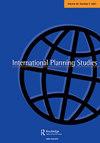从根本原因的角度探讨改善马来西亚低成本住房供应的政策选择
IF 1.5
Q4 REGIONAL & URBAN PLANNING
引用次数: 3
摘要
自1982年以来,马来西亚政府和私人住房开发商一直在提供低成本住房(LCH),但住房的稀缺性却在增加。本文调查了根本原因,并探讨了可能的政策选择,以改善马来西亚LCH提供通过一个未探索的维度。首先,通过定性方法进行口头访谈的结果在定量阶段进行了测试和分析。马来西亚LCH政策制定者进一步验证了“量化发现”。调查结果证实了各州的LCH政策宽松。研究发现,数据共享不足、部分开发者回避构建LCH、允许开发者构建LCH的宽松状态政策等是导致状态LCH政策宽松的根本原因。该研究提出了一些建议,这将为进一步研究累积裁决、联合工作组等带来新的突破口,作为对知识进步的理论贡献的一部分。本文章由计算机程序翻译,如有差异,请以英文原文为准。
Root cause approach to explore policy options for improving low-cost housing provision in Malaysia
ABSTRACT Since 1982, the Malaysian Government and private housing developers have been providing low-cost housing (LCH) yet the scarcity of houses is on the increase. This paper investigates the root cause and explores possible policy options for improving Malaysian LCH provision via an unexplored dimension. First, findings from the oral interviews via qualitative approach were tested and analysed at the quantitative phase. The ‘quantilised findings’ were further validated by the Malaysian LCH policymakers. Findings confirm lax state LCH policy across the states. The study found lack of data sharing, some developers evade construction of LCH, relaxed state policy that allows developers to construct LCH, among others as the root cause of lax state LCH policy. The study proffered some recommendations and this will bring to the front burner new openings such as cumulative ruling, joint task force, among others for further study as part of the theoretical contribution to knowledge advancement.
求助全文
通过发布文献求助,成功后即可免费获取论文全文。
去求助
来源期刊

International Planning Studies
REGIONAL & URBAN PLANNING-
CiteScore
4.60
自引率
4.80%
发文量
20
期刊介绍:
Planning, at urban, regional, national and international levels, faces new challenges, notably those related to the growth of globalisation as both an objective socio-economic process and a shift in policy-maker perceptions and modes of analysis. International Planning Studies (IPS) addresses these issues by publishing quality research in a variety of specific fields and from a range of theoretical and normative perspectives, which helps improve understanding of the actual and potential role of planning and planners in this context.
 求助内容:
求助内容: 应助结果提醒方式:
应助结果提醒方式:


